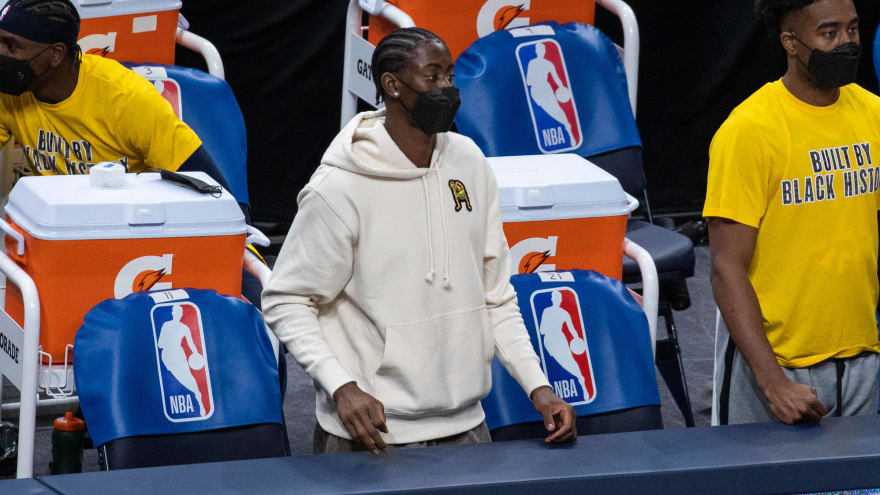As we head into the second half of the NBA season, there is a lot of talk about the “disrespect” of the league-leading Utah Jazz. The Jazz are 30 – 11 (at the time this is written), are top 10 in points per game and opponent points per game, which leads them to the league’s number one net rating. They had three NBA All-Stars (after the Mike Conley addition), the leader for Sixth Man of the Year, and the probable Defensive Player of the Year. But many analysts see barriers between them and the Larry O’Brien trophy this summer, and the entire state of Utah is upset about it.
Fact: The @utahjazz are one of the winningest franchises in the NBA.
— Jazz SPORTalk (@SPORTalkJazz) March 5, 2021
Is this why they get so much hate because they beat these people’s favorite teams so much growing up??
Are the Utah jazz the most hated franchise in the NBA?
And the while the replies to tweets across #NBATwitter are funny… Jazz fans have a point. NBA analysts hate super teams, want some parity, and crave a small market juggernaut. Then Utah becomes the anti-super team, atop the league, in one of the NBA’s smallest markets and no one believes in them. Perhaps more painful for the fans of the Jazz, no one likes them.
But this isn’t as much a contradiction as it is a reaction to recent Utah Jazz history. Without diving into the X’s and O’s analysis on what is wrong with Utah, there are some broader storylines that people have issues with over the last few seasons. It’s hard to root for a team that has brought about such tomfoolery in recent years, and it’s easy to understand why so many root against them.
What is a Rookie?
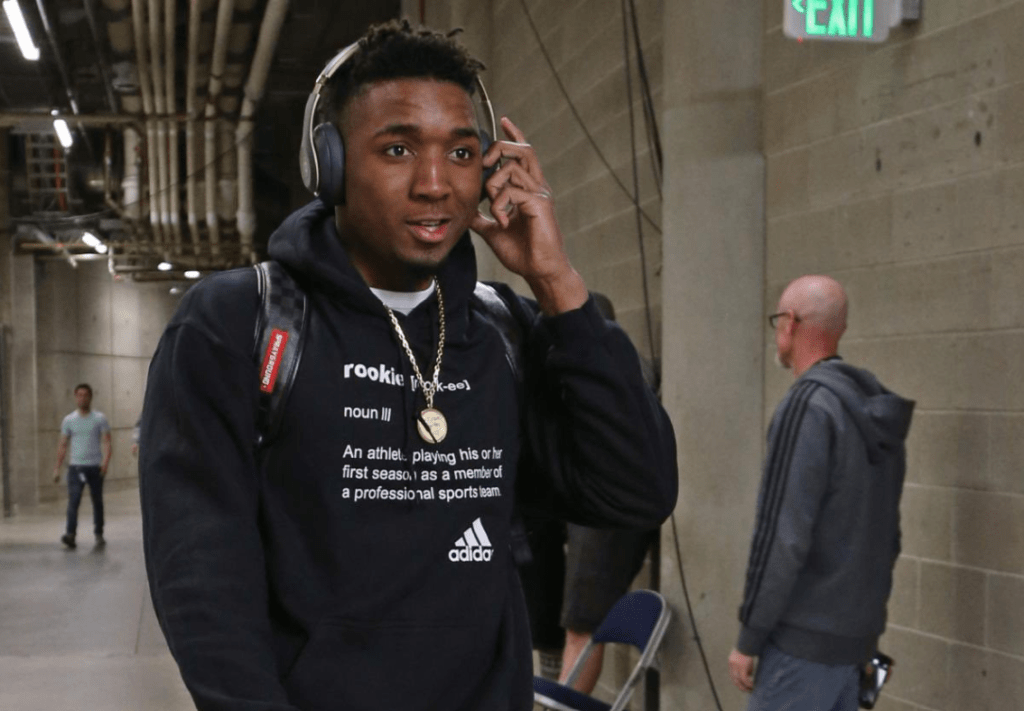
When Donovan Mitchell was drafted 13th overall in the summer of 2017, many knew he’d make it in the NBA. In two seasons at Louisville, Mitchell showed serious growth as a shot creator and scorer. Some thought he could even be a good NBA player. Few even projected he’d be a long-time career starter. But almost no one thought he’d be one of the best players in the class. Seven of the 12 picks ahead of Mitchell were also guards, including two of the top three picks.
Logically, he and many fans thought that was enough to earn Rookie of the Year. He ended up losing the award to Ben Simmons. Simmons was classified as a rookie in the 2017-18 season, as opposed to the year before, because of an injury. Simmons had a fracture in his foot in the preseason and ran into complications healing it. Thus, his Rookie campaign was his second year under contract even though it was his first year playing.
Simmons was drafted in 2016 as the number one overall pick by the Philadelphia 76ers one year after being the top-ranked player in the high school class of 2015. Mitchell was, per ESPN recruit rankings, the 43rd ranked player in the same class.
The Debate
Mitchell and Jazz fans were perplexed as to how Simmons could still be a Rookie. Donovan Mitchell was in his first year under contract and in the most recent draft class. How could someone draft the year before beating him out? Mitchell versus Simmons became an argument in semantics. Who does and should qualify for Rookie of the Year became the crux of the discussion. So much so that Mitchell, and Adidas, even launched a campaign of clothing defining what a rookie was.
This was the losing hand for Mitchell, the Jazz, and Adidas. They had no argument, collectively, that Mitchell was better than Simmons. All Team Mitchell could muster is that he fit the description. That flawed argument loses when, in technicality, Simmons also fits the description.
This move was as dividing as their seasons were. Mitchell and Utah alienated half of the country siding with Simmons when he donned that hoodie. If your best argument for an award is your definition of it, you’re gonna miss it. Nike, however, did not.
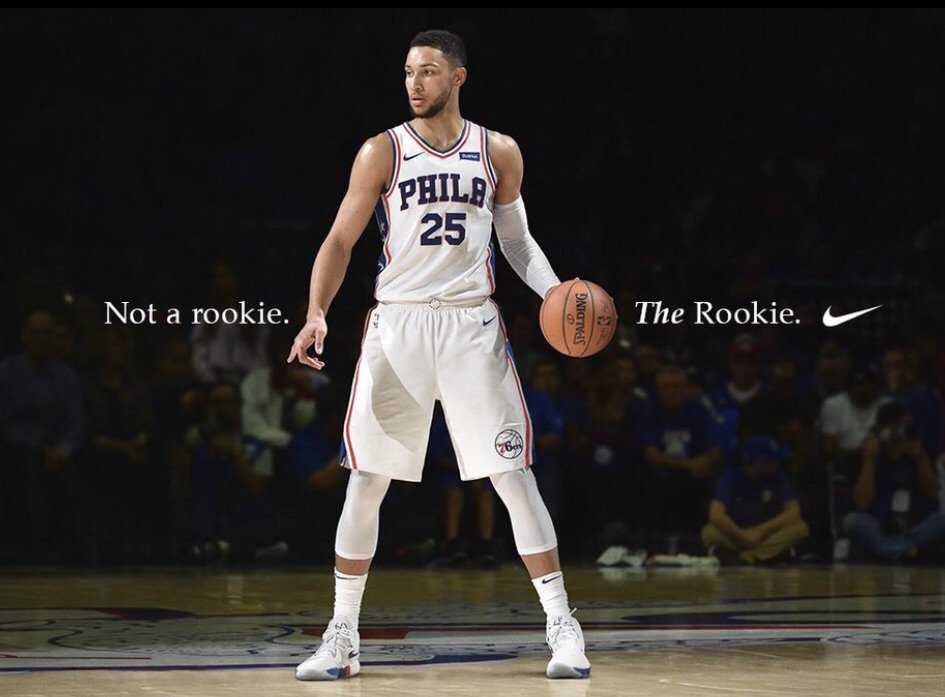
Tears
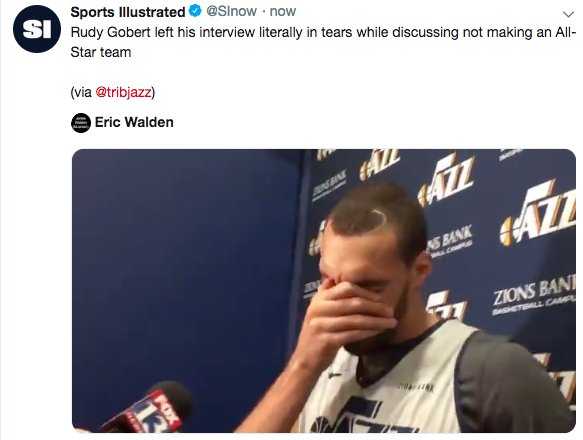
Another piece of the success in Utah this year has been the play of Rudy Gobert. Gobert, sometimes called the Stifle Tower, is a seven-foot-one center with a seven-foot-nine wingspan from France. After showing up as a lanky 21-year-old in 2013, Gobert has developed into a defensive force in Utah. He’s made four All-Defensive teams, won two Defensive Player of the Year awards, and -finally- has now made the All-Star game twice.
There was a time in his eight-year career where, while he was the league’s best defender, he was just an average, rim-running offensive threat for a middle of the Western Conference Utah team. That meant that, while he was getting the accolades for his defensive play, he didn’t make the All-Star game.
It’s the 21st century. It’s not that a grown man can’t cry… but to be brought to tears over missing an All-Star game in your sixth year, rubbed a lot of people the wrong way. In the Western Conference, the 2019 All-Star roster had several perennial All-Star caliber big-men. The two younger players, Karl-Anthony Towns and Nikola Jokic, were do-it-all big men redefining what the Center position was.
Gobert later got his accolades for what he does: defend. In that same season, he became just the ninth player to win the Defensive Player of the Year award in back-to-back seasons. They don’t hand out an “All-Offensive Team” or name an “Offensive Player of the Year” award, and that’s become what the All-Star game is for. So if that’s not you, why are we crying midseason?.. Perhaps, for the notoriety?
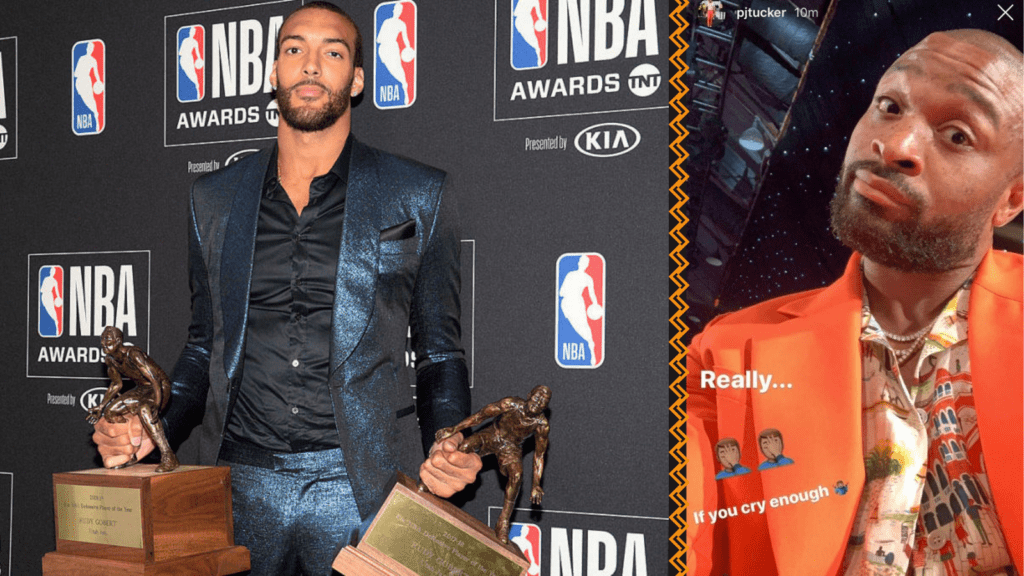
Rudy and Covid
Happy first anniversary pic.twitter.com/oMD8Fushjc
— Freezing Cold Takes (@OldTakesExposed) March 9, 2021
While we have learned much about Covid in the interim, and hindsight tells us the league was bound to have someone test positive and shut it down… it certainly didn’t have to be a person who made such an ass out of the impending pandemic. Gobert made a mockery of the initial protocols by touching everyone’s microphone and voice recorder reportedly had a similar candor in the locker room, and then dd test positive for the disease.
Royce Young, a reporter for the Oklahoma City Thunder, was the most detailed in outlining the crazy night that followed. The Jazz, even though Rudy Gobert didn’t make the trip to Oklahoma, had to leave the floor, isolate, and test. The Thunder had to do the same. Stadium staff and personnel as well. No one left until results began to come back negative.
This was much earlier in the world’s collective understanding of the Coronavirus. We now know that Gobert likely didn’t pass it by touching microphones and that it is unlikely that a Thunder player could have gotten it warming up on the opposite side of the floor from a Jazz player. At this moment we understand the science of that much better. But at that moment? It was scary. In both moments, Gobert’s actions made him stand out as a jerk.
So yes, there is plenty of reason to “be a hater” when it comes to Rudy Gobert.
Fans
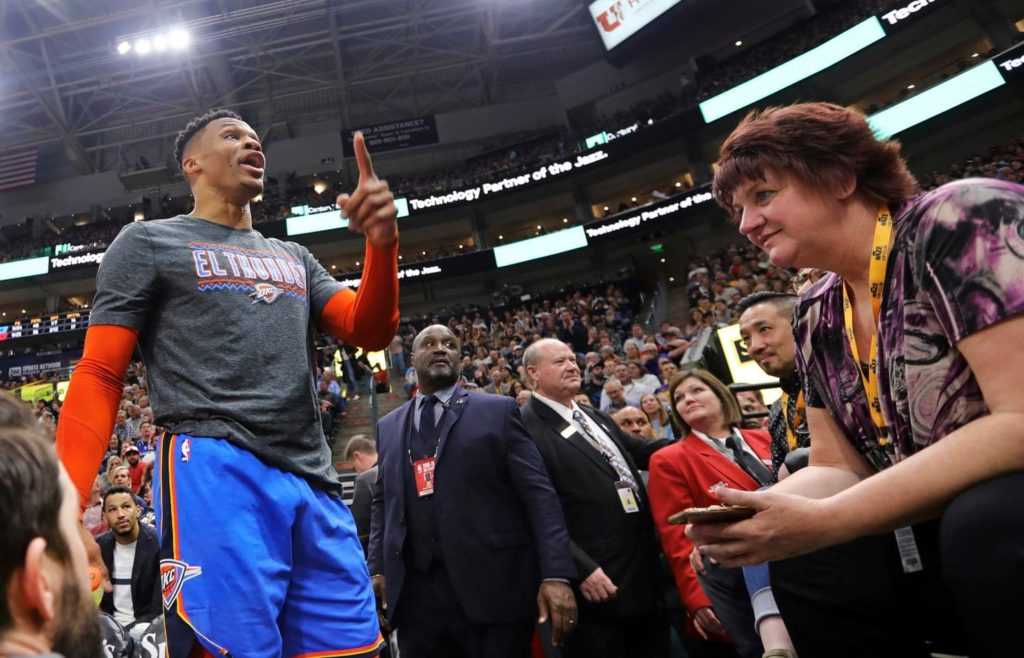
Many remember the confrontation between Russell Westbrook and Utah Jazz fan Shane Kiesel. Some may even recall the franchise issued him a lifetime ban. What has gone under-reported is that Kiesel’s defense, after being accused of racially charged animosity, was that Westbrook misheard him and that his behavior was in line with the rest of his section.
No, the fan didn’t say they weren’t being a jerk… just that everyone else around him was, and that it’s not fair to punish him for being the same jerk as every other jerk in Vivint Arena.
That’s on-brand for the Salt Lake faithful. Over a decade ago, Derek Fisher caught the brunt of the boos. After a medical diagnosis with his daughter, Fisher asked to be sent to LA in the off-season to be with his family. Even though he saved the day in Utah, fans launched personal attacks at Fisher in a Laker Jazz playoff series the next season.
Other former pros have pointed out the same issues, arguing that the city has this reputation. Matt Barnes even bluntly stated that it’s racially motivated.
It’s not that Utah is the only city or fanbase with this reputation. Just weeks before the Westbrook incident, Damian Lillard had a similar run-in with a fan in Minnesota. But Minnesota isn’t leading the league and wondering why people hate them.
Coach Wants to Destroy Gotham
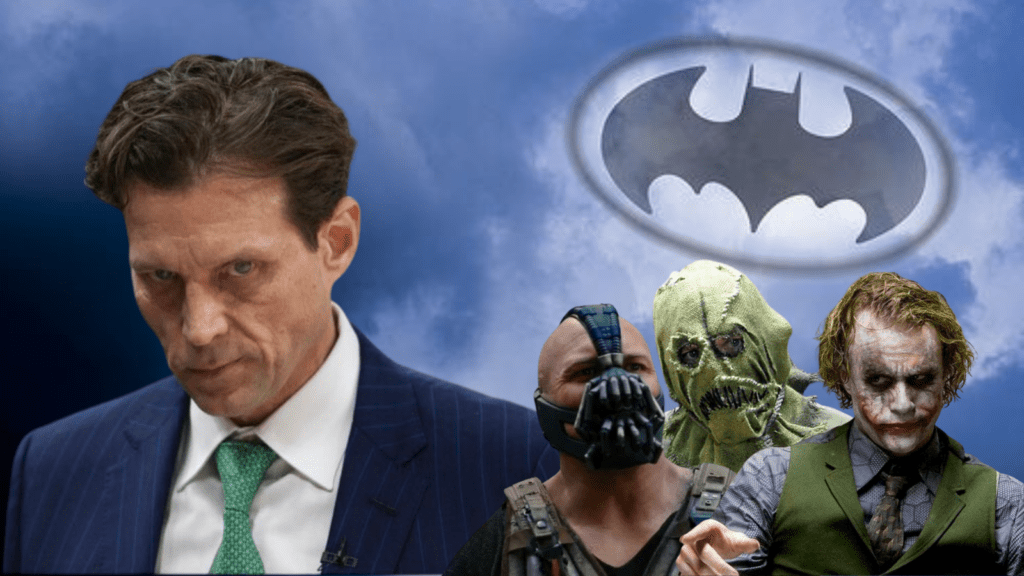
Quin Snyder has had an incredible rise in the coaching ranks. After a six-year stint as an assistant at Duke, and a seven-year tenure as the head coach at Missouri, Snyder’s first pro head coaching job was with the Austin Toros of the NBA’s D-League. From there, Snyder had assistant coaching roles in Philadelphia, Los Angeles, Moscow, and Atlanta before finally getting a shot in Utah. The Jazz have made the playoffs four straight seasons, and are atop the Western Conference right now.
But at what cost?
While the story is yet to be written, Coach Snyder is clearly an under-discussed Batman villain. While we all await his appearance in the next part of The Dark Knight series, it’s hard to want to see him win if Gotham has to lose.
For more on sports, sneakers, and fandom, follow me @painsworth512 for more, and give our podcast “F” In Sports a listen wherever you listen to podcasts!
Be sure to check our NEW weekly basketball show, The Midweek Midrange, on YouTube, Twitter, and Instagram!


